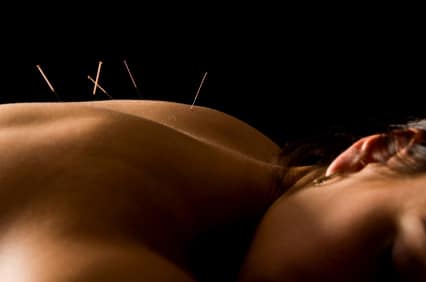Does acupuncture hurt?
No, acupuncture is typically not painful. The needles are very thin, and most people feel either a slight pinch, or nothing at all, during insertion. Once the needles are in you can barely feel them at all.
Overall the experience of acupuncture is very relaxing, and many people fall asleep during treatment.
What if I’m really sensitive?
If anything feels uncomfortable, we are always happy to switch to extra-thin needles, choose less sensitive points, or use non-needle therapies like acupressure and heat therapy. Our philosophy is that acupuncture works best when it is relaxing and comfortable for the patient.
Is acupuncture safe?
Acupuncture is one of the safest forms of health care available. Sterile procedures are strictly followed, and acupuncture points and techniques are designed to avoid any possibility of injury. The most common side effect of acupuncture is an occasional bruise at the site of insertion.
The NIH (National Institutes for Health) statement on acupuncture concluded that acupuncture is generally safer than Western medicine, saying:
One of the advantages of acupuncture is that the incidence of adverse effects is substantially lower than that of many drugs or other accepted medical procedures used for the same condition.
What about cleanliness?
Acupuncturists follow the standard medical protocols for infection control, including thorough hand-washing; swabbing points with alcohol prior to treatment; use of sterilized, sealed, single-use needles; and disposal of used needles in biohazard containers.
Where are the acupuncture points?
There are over 300 acupuncture points on the body, and they are located pretty much everywhere. The most commonly used points are on the arms and legs; the torso and head are often treated as well.
What happens in a treatment?
At the beginning of each session we talk briefly about the problems to be treated, and we will feel your pulse and look at your tongue to develop a diagnosis and treatment plan for you.
Treatment takes place with you lying comfortably on a massage table. Needles are inserted at various points on the body based on your diagnosis; then you rest for a while with the needles in (this is the part where people fall asleep). After 20-30 minutes I take the needles out and voilà! — you’re good to go.
Click here to see a more detailed description of the treatment process.
I’ve heard acupuncture is good for my condition, but I’m totally needle-phobic. Can you help me?
Yes. Please come in and talk to us. There are many non-needle therapies available, including acupressure, heat therapy, and magnets or press balls (little ball bearings on a tiny band-aid) that go on the acupuncture point to gently stimulate it.
Herbal medicine is also a good alternative for people who wish to avoid needles.
And, many patients who describe themselves as needle-phobic are pleasantly surprised by how small and painless the acupuncture needles actually are. If you want to give it a try, we can go one needle at a time and stop whenever you feel uncomfortable. If acupuncture is really not for you, we won’t charge you for the session.
How many treatments will I need?
This depends on the nature, severity, and duration of your condition. Some acute problems get better with just a couple sessions. Most longer-standing issues resolve with 4 to 15 treatments. Some degenerative conditions may require numerous visits over time.
What about maintenance?
Results are usually well-maintained once treatment is finished. Some people come back for occasional “tune-ups” to stay in balance, or when they feel the first inklings of the problem coming back.
When should I use acupuncture vs. Western medicine?
In general, Western medicine is very good at acute and emergency situations, and also very talented at diagnosis and screening. For a major, life-threatening problem, definitely see your doctor. Same if you have a new health problem and don’t know whether it’s serious.
Chinese medicine excels at treating chronic conditions and promoting wellness.
The best times to use acupuncture are:
- For conditions that are not well understood or effectively treated by Western medicine, including chronic and recurring illnesses.
- As an alternative to Western medicine if you prefer a more holistic, drug-free approach to health problems. (Check here for a list of conditions treated by acupuncture.)
- For day-to-day health concerns like colds and flu, sinus infections, minor injuries, stress, and health maintenance.
Acupuncturists are trained to recognize serious health situations that require Western medical care. I will always refer you to your doctor when it’s appropriate, especially if I have any concerns about your safety.
Can I do acupuncture at the same time as my regular medical treatment?

Absolutely. Often this is the best way to get good results. Acupuncture can be used to treat symptoms that aren’t responding to Western treatment; to work on the underlying imbalances to prevent recurrence; and to help treat the side effects of medications.
Acupuncture is wonderful in conjunction with physical therapy and chiropractic care; it can loosen tight muscles, decrease inflammation and pain, and speed healing. This makes the exercises easier to do, and increases the effectiveness of both therapies.
What are the qualifications required to be an acupuncturist?
Laws governing acupuncture licensing vary from state to state. In Massachusetts, acupuncturists are licensed by the Board of Registration in Medicine (the same body that licenses doctors and nurses in the state). To be licensed, acupuncturists must have a degree from an approved school program with more than 1900 hours of coursework, including at least 100 hours of supervised internship. This translates to 3-4 years of full-time, year-round schooling.
All the standard pre-medical courses are also required, and acupuncturists must pass national licensing exams covering Western medical knowledge, Chinese medical diagnosis and treatment, acupuncture point location, safety, and ethics.
Licensed acupuncturists must also complete 30 hours of continuing education every two years.
How does acupuncture work, in Traditional Chinese Medicine terms?
According to Chinese medicine, pain and illness arise when the body is out of balance. Acupuncture works by stimulating specific points along the channels of energy flow to re-balance the body so it can heal itself.
How does this work, in scientific terms?
No one knows for sure what the mechanisms of acupuncture are, but scientific studies have observed a number of changes in the body with acupuncture.
- Acupuncture causes chemical changes in the body. These include the release of endorphins, neurotransmitters, and neurohormones; effects on the hypothalamus and pituitary glands; and changes in the immune system.
- Acupuncture causes changes in the brain that are observable with fMRI. Individual studies have found increased activity in the areas of the brain that process pain stimuli. One study noted increased activity in the visual cortex when a point on the little toe, traditionally used for eye problems, was needled.
- One recent study suggests that signals from acupuncture treatment are transmitted through the connective tissue that holds together all our muscles, bones, and internal organs. This may help explain how a point on the leg, for example, can have an immediate effect on digestion.
- Acupuncture points have been measured to be areas of lower-than-normal electrical conductivity on the skin.
Is there science that supports the effectiveness of acupuncture?
Yes. Numerous Western medical studies have been completed on acupuncture both in the U.S. and in Europe. Many of these studies are randomized controlled trials meeting the gold standard for modern scientific medical research.
Medical researchers at both the National Institutes of Health (NIH) and the World Health Organization (WHO) have reviewed the current scientific literature on acupuncture. Both organizations conclude that acupuncture definitely works for a number of conditions for which studies have been completed, and that further research is needed to look at additional conditions.
The official NIH statement on acupuncture concludes that:
The data in support of acupuncture are as strong as those for many accepted Western medical therapies.
It goes on to note:
One of the advantages of acupuncture is that the incidence of adverse effects is substantially lower than that of many drugs or other accepted medical procedures used for the same condition.
Will my insurance cover this?
Acupuncture coverage varies among health plans. More and more policies are adding acupuncture coverage every year, so it is worth checking your benefits. The easiest way to do this is by submitting your information on our New Patient page. For more information on insurance, including the insurances we accept, please see the “Insurance & Payment” section on the Office Information page.
Can I use my flexible spending health care account?
Yes. You can use your benefits card, or we can provide you with a billing statement to submit for reimbursement. Acupuncture is also tax-deductible on your federal taxes if you itemize deductions.
Are the herbs safe to take?
Chinese herbs are wonderfully safe and effective when taken as prescribed. Prescriptions are tailored to your individual situation, and designed to minimize side effects and risks. The most common side effect is a little trouble digesting the herbs. This can usually be avoided by including herbs that protect the stomach and support digestion.
What about quality control?
We use herbs only from companies that adhere to strict international standards for Good Manufacturing Practices (GMP). This means that herbal products are compiled in regularly-inspected facilities and are tested rigorously for content, label accuracy, and impurities.
Will herbs interact with my medications?
We will ask for a complete list of your medications, and will take into account any potential interactions when writing your herbal prescription. In most cases, it is safe to take herbs and medications together; if we are concerned about possible adverse interactions, we may choose to treat with acupuncture only.
 Still have questions? You can:
Still have questions? You can:
- Email or call us with your questions
- Check out the blog for more in-depth articles on Chinese medicine
- Schedule an initial consultation to discuss your questions and concerns in person
